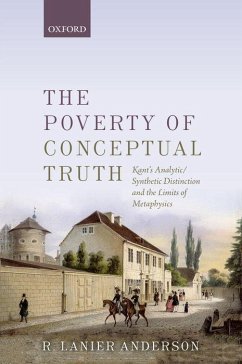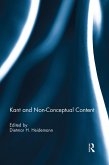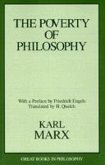R Lanier Anderson
The Poverty of Conceptual Truth
Kant's Analytic/Synthetic Distinction and the Limits of Metaphysics
Schade – dieser Artikel ist leider ausverkauft. Sobald wir wissen, ob und wann der Artikel wieder verfügbar ist, informieren wir Sie an dieser Stelle.
R Lanier Anderson
The Poverty of Conceptual Truth
Kant's Analytic/Synthetic Distinction and the Limits of Metaphysics
- Broschiertes Buch
- Merkliste
- Auf die Merkliste
- Bewerten Bewerten
- Teilen
- Produkt teilen
- Produkterinnerung
- Produkterinnerung
R. Lanier Anderson presents a new account of Kant's distinction between analytic and synthetic judgments, and provides it with a clear basis within traditional logic. He reconstructs compelling claims about the syntheticity of elementary mathematics, and re-animates Kant's arguments against traditional metaphysics in the Critique of Pure Reason.
Andere Kunden interessierten sich auch für
![Kant and Non-Conceptual Content Kant and Non-Conceptual Content]() Kant and Non-Conceptual Content64,99 €
Kant and Non-Conceptual Content64,99 €![The Concept 'Horse' Paradox and Wittgensteinian Conceptual Investigations The Concept 'Horse' Paradox and Wittgensteinian Conceptual Investigations]() Kelly Dean JolleyThe Concept 'Horse' Paradox and Wittgensteinian Conceptual Investigations70,99 €
Kelly Dean JolleyThe Concept 'Horse' Paradox and Wittgensteinian Conceptual Investigations70,99 €![The Poverty of Philosophy The Poverty of Philosophy]() Karl MarxThe Poverty of Philosophy8,49 €
Karl MarxThe Poverty of Philosophy8,49 €![The Paradox Of Wealth And Poverty The Paradox Of Wealth And Poverty]() Daniel LittleThe Paradox Of Wealth And Poverty71,99 €
Daniel LittleThe Paradox Of Wealth And Poverty71,99 €![The Poverty Of Philosophy The Poverty Of Philosophy]() Karl MarxThe Poverty Of Philosophy22,99 €
Karl MarxThe Poverty Of Philosophy22,99 €![The Poverty of Philosophy The Poverty of Philosophy]() Karl MarxThe Poverty of Philosophy12,99 €
Karl MarxThe Poverty of Philosophy12,99 €![The Blessings of Poverty The Blessings of Poverty]() Diane BooneThe Blessings of Poverty18,99 €
Diane BooneThe Blessings of Poverty18,99 €-
-
-
R. Lanier Anderson presents a new account of Kant's distinction between analytic and synthetic judgments, and provides it with a clear basis within traditional logic. He reconstructs compelling claims about the syntheticity of elementary mathematics, and re-animates Kant's arguments against traditional metaphysics in the Critique of Pure Reason.
Produktdetails
- Produktdetails
- Verlag: Oxford University Press
- Seitenzahl: 432
- Erscheinungstermin: 1. Januar 2018
- Englisch
- Abmessung: 231mm x 154mm x 27mm
- Gewicht: 641g
- ISBN-13: 9780198801405
- ISBN-10: 0198801408
- Artikelnr.: 48808963
- Herstellerkennzeichnung
- Libri GmbH
- Europaallee 1
- 36244 Bad Hersfeld
- gpsr@libri.de
- Verlag: Oxford University Press
- Seitenzahl: 432
- Erscheinungstermin: 1. Januar 2018
- Englisch
- Abmessung: 231mm x 154mm x 27mm
- Gewicht: 641g
- ISBN-13: 9780198801405
- ISBN-10: 0198801408
- Artikelnr.: 48808963
- Herstellerkennzeichnung
- Libri GmbH
- Europaallee 1
- 36244 Bad Hersfeld
- gpsr@libri.de
R. Lanier Anderson is Professor of Philosophy (and by courtesy, of German Studies) at Stanford University, where he currently chairs the Philosophy Department. He works in the history of late modern philosophy with primary focus on Kant and nineteenth century philosophy, and is the author of a numerous articles about Kant, Nietzsche, and the neo-Kantian movement. His other research interests include Nietzsche's moral psychology and various topics in the philosophy of Montaigne.
* Introduction
* 1: Containment Analyticity and Kant's Problem of Synthetic Judgment
* Part I--The Traditional Logic of Concept Containment and its
(alleged) Metaphysical Implications
* 2: Containment and the Traditional Logic of Concepts
* 3: The Wolffian Paradigm
* 4: Narrowness and Trade-offs: Conceptual Truth in the
'Leibnizian-Wolffian' Philosophy
* Part II--A Difficult Birth: the Emergence of Kant's
Analytic/Synthetic Distinction
* 5: Three Versions of Analyticity
* 6: Methodological Beginnings: Analysis and Synthesis in the Published
pre-Critical Works
* 7: Making Synthetic Judgments Analytic: Kant's Long Road toward
Logical Analyticity in the Reflexionen
* Part III--Ineliminable Synthetic Truth in Elementary Mathematics
* 8: The Logic of Concepts and a 'Two Step' Syntheticity Argument
* 9: Kant on the Syntheticity of Elementary Mathematics
* Part IV--The Poverty of Conceptual Truth and the Master Argument of
the 'Transcendental Dialectic'
* 10: The Master Argument
* 11: The Soul and the World: the Master Argument in Kant's
'Paralogisms' and 'Antinomy'
* 12: The Master Argument in the Critique of Rational Theology
* Epilogue
* 13: Empirical Concept Formation and the Systematic Role of Logical
Division
* Appendix 1: Kant's Criticisms of the Ontological Argument in 1763
* Four Strands of Reflexionen on the Emerging Analytic/Synthetic
Distinction
* Friedman and the Phenomenological Reading
* 1: Containment Analyticity and Kant's Problem of Synthetic Judgment
* Part I--The Traditional Logic of Concept Containment and its
(alleged) Metaphysical Implications
* 2: Containment and the Traditional Logic of Concepts
* 3: The Wolffian Paradigm
* 4: Narrowness and Trade-offs: Conceptual Truth in the
'Leibnizian-Wolffian' Philosophy
* Part II--A Difficult Birth: the Emergence of Kant's
Analytic/Synthetic Distinction
* 5: Three Versions of Analyticity
* 6: Methodological Beginnings: Analysis and Synthesis in the Published
pre-Critical Works
* 7: Making Synthetic Judgments Analytic: Kant's Long Road toward
Logical Analyticity in the Reflexionen
* Part III--Ineliminable Synthetic Truth in Elementary Mathematics
* 8: The Logic of Concepts and a 'Two Step' Syntheticity Argument
* 9: Kant on the Syntheticity of Elementary Mathematics
* Part IV--The Poverty of Conceptual Truth and the Master Argument of
the 'Transcendental Dialectic'
* 10: The Master Argument
* 11: The Soul and the World: the Master Argument in Kant's
'Paralogisms' and 'Antinomy'
* 12: The Master Argument in the Critique of Rational Theology
* Epilogue
* 13: Empirical Concept Formation and the Systematic Role of Logical
Division
* Appendix 1: Kant's Criticisms of the Ontological Argument in 1763
* Four Strands of Reflexionen on the Emerging Analytic/Synthetic
Distinction
* Friedman and the Phenomenological Reading
* Introduction
* 1: Containment Analyticity and Kant's Problem of Synthetic Judgment
* Part I--The Traditional Logic of Concept Containment and its
(alleged) Metaphysical Implications
* 2: Containment and the Traditional Logic of Concepts
* 3: The Wolffian Paradigm
* 4: Narrowness and Trade-offs: Conceptual Truth in the
'Leibnizian-Wolffian' Philosophy
* Part II--A Difficult Birth: the Emergence of Kant's
Analytic/Synthetic Distinction
* 5: Three Versions of Analyticity
* 6: Methodological Beginnings: Analysis and Synthesis in the Published
pre-Critical Works
* 7: Making Synthetic Judgments Analytic: Kant's Long Road toward
Logical Analyticity in the Reflexionen
* Part III--Ineliminable Synthetic Truth in Elementary Mathematics
* 8: The Logic of Concepts and a 'Two Step' Syntheticity Argument
* 9: Kant on the Syntheticity of Elementary Mathematics
* Part IV--The Poverty of Conceptual Truth and the Master Argument of
the 'Transcendental Dialectic'
* 10: The Master Argument
* 11: The Soul and the World: the Master Argument in Kant's
'Paralogisms' and 'Antinomy'
* 12: The Master Argument in the Critique of Rational Theology
* Epilogue
* 13: Empirical Concept Formation and the Systematic Role of Logical
Division
* Appendix 1: Kant's Criticisms of the Ontological Argument in 1763
* Four Strands of Reflexionen on the Emerging Analytic/Synthetic
Distinction
* Friedman and the Phenomenological Reading
* 1: Containment Analyticity and Kant's Problem of Synthetic Judgment
* Part I--The Traditional Logic of Concept Containment and its
(alleged) Metaphysical Implications
* 2: Containment and the Traditional Logic of Concepts
* 3: The Wolffian Paradigm
* 4: Narrowness and Trade-offs: Conceptual Truth in the
'Leibnizian-Wolffian' Philosophy
* Part II--A Difficult Birth: the Emergence of Kant's
Analytic/Synthetic Distinction
* 5: Three Versions of Analyticity
* 6: Methodological Beginnings: Analysis and Synthesis in the Published
pre-Critical Works
* 7: Making Synthetic Judgments Analytic: Kant's Long Road toward
Logical Analyticity in the Reflexionen
* Part III--Ineliminable Synthetic Truth in Elementary Mathematics
* 8: The Logic of Concepts and a 'Two Step' Syntheticity Argument
* 9: Kant on the Syntheticity of Elementary Mathematics
* Part IV--The Poverty of Conceptual Truth and the Master Argument of
the 'Transcendental Dialectic'
* 10: The Master Argument
* 11: The Soul and the World: the Master Argument in Kant's
'Paralogisms' and 'Antinomy'
* 12: The Master Argument in the Critique of Rational Theology
* Epilogue
* 13: Empirical Concept Formation and the Systematic Role of Logical
Division
* Appendix 1: Kant's Criticisms of the Ontological Argument in 1763
* Four Strands of Reflexionen on the Emerging Analytic/Synthetic
Distinction
* Friedman and the Phenomenological Reading

